Partnerships
- New Orleans Collaborative for Early Childhood Research
- Louisiana Department of Education Collaborations
The New Orleans Collaborative for Early Childhood Research (CECR) is a partnership between the Early Childhood Policy Research Lab at Tulane University, Agenda for Children, and New Orleans Public Schools. Founded in 2019, the collaborative works with families, community members, and local practitioners to co-create the knowledge, resources, and support needed to access critical programs and supports.
CECR Publications
Current Projects
With funding from the National Science Foundation, CECR is working with other government agencies in Louisiana to test the effects of offering SNAP applicants the chance to start their applications for other programs. The pilot concluded in September 2024, and results will be available in Spring 2025.
The Louisiana Department of Education (LDOE) has been a partner in this work since the lab’s inception, collaborating on the development of research topics and providing valuable state-specific context data necessary for the research. The research agenda closely aligns with current LDOE initiatives and priorities, including access to high-quality early learning programs and early literacy initiatives in Louisiana.
Community Supply Building and Access Expansion Grant Implementation Assessment
 The Louisiana Department of Education (LDOE) created a local early childhood community network for each parish in the state to improve access to and support for high-quality publicly funded early learning programs. Each community network has a lead agency responsible for the administrative oversight of their parish’s publicly-funded early childhood education (ECE) programs. In 2021, the LDOE launched a grant initiative—the Community Supply Building and Access Expansion (CSBAE) grant—to support lead agencies in developing community-based strategies broadly aimed at increasing access to ECE and care. CSBAE grant funds flowed through selected lead agencies that then allocated funds to consultants, center directors, and partners in their parish to assist in the planning and implementation phases of their work. The funds from these CSBAE grants supported two phases of planning and development. Phase I was a strategic planning and design phase focused on gathering community access data to identify early learning needs in the community and developing a strategic plan to address those needs. Phase II focused on strategy implementation and sustainability planning. To date, 27 agencies across two cohorts have received CSBAE grant funds.
The Louisiana Department of Education (LDOE) created a local early childhood community network for each parish in the state to improve access to and support for high-quality publicly funded early learning programs. Each community network has a lead agency responsible for the administrative oversight of their parish’s publicly-funded early childhood education (ECE) programs. In 2021, the LDOE launched a grant initiative—the Community Supply Building and Access Expansion (CSBAE) grant—to support lead agencies in developing community-based strategies broadly aimed at increasing access to ECE and care. CSBAE grant funds flowed through selected lead agencies that then allocated funds to consultants, center directors, and partners in their parish to assist in the planning and implementation phases of their work. The funds from these CSBAE grants supported two phases of planning and development. Phase I was a strategic planning and design phase focused on gathering community access data to identify early learning needs in the community and developing a strategic plan to address those needs. Phase II focused on strategy implementation and sustainability planning. To date, 27 agencies across two cohorts have received CSBAE grant funds.
To assess the implementation of these grants, LDOE contracted with Tulane’s Early Childhood Policy Research Lab to conduct an independent study of grantees’ successes and challenges with the program. The findings were drawn from interviews with lead agencies, consultants, and ECE center directors in parishes that received grant funding in 2021 as a part of the first CSBAE cohort. The final report was intended to inform future state funding efforts and program initiatives.
Current Projects
With funding from the Institute of Education Sciences and the Student Upward Mobility Initiative, we are examining how Louisiana children’s literacy skills develop between PK and 3rd grade, and the extent to which those early skills predict later outcomes.

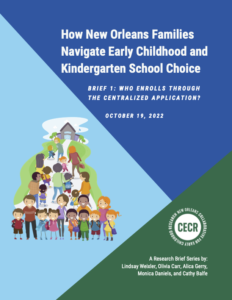
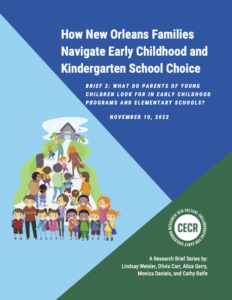 The second brief in the series “How New Orleans Families Navigate Early Childhood and Kindergarten School Choice” looks at what parents of young children look for in early childhood programs and elementary schools. Program quality is paramount for parents, but they define quality differently based on whether they’re seeking an early learning program or kindergarten. Location, school culture and other considerations also factor into parents’ decision-making.
The second brief in the series “How New Orleans Families Navigate Early Childhood and Kindergarten School Choice” looks at what parents of young children look for in early childhood programs and elementary schools. Program quality is paramount for parents, but they define quality differently based on whether they’re seeking an early learning program or kindergarten. Location, school culture and other considerations also factor into parents’ decision-making.
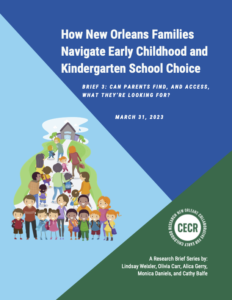 This third brief in a seven-part series summarizes responses from 100 parents who applied for or enrolled in a public school or early childhood education (ECE) program in 2020, about whether they can access their preferred programs and schools. The brief explores parents’ perceptions of whether they can access high-quality programs, barriers to access and parents’ concerns about equity. It also looks at the role of geography in parents’ choices and finds that geographic constraints often limited their accessible set of program options.
This third brief in a seven-part series summarizes responses from 100 parents who applied for or enrolled in a public school or early childhood education (ECE) program in 2020, about whether they can access their preferred programs and schools. The brief explores parents’ perceptions of whether they can access high-quality programs, barriers to access and parents’ concerns about equity. It also looks at the role of geography in parents’ choices and finds that geographic constraints often limited their accessible set of program options.
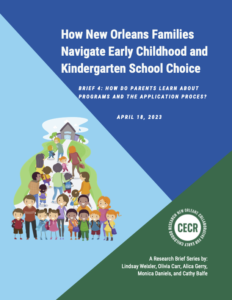 The fourth brief in the series “How New Orleans Families Navigate Early Childhood and Kindergarten School Choice” summarizes responses from 100 parents who applied for or enrolled in a public school or early childhood education (ECE) program in New Orleans in 2020, about the ways in which they gathered information both about programs and the application process. Choosing the right program for a child can be a daunting experience for parents. This brief explores where parents looked for informational support, and how they ultimately experienced the process of choosing and applying for schools.
The fourth brief in the series “How New Orleans Families Navigate Early Childhood and Kindergarten School Choice” summarizes responses from 100 parents who applied for or enrolled in a public school or early childhood education (ECE) program in New Orleans in 2020, about the ways in which they gathered information both about programs and the application process. Choosing the right program for a child can be a daunting experience for parents. This brief explores where parents looked for informational support, and how they ultimately experienced the process of choosing and applying for schools.
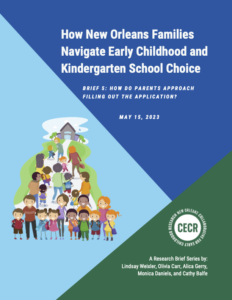 The fifth brief in the series “How New Orleans Families Navigate Early Childhood and Kindergarten School Choice” looks at how parents approached the common application process for early childhood and kindergarten programs in New Orleans. The substantial amount of information to sort through leaves some parents feeling as though they don’t have enough information about the programs available to them. This brief examines what that means for the way parents approach the application, and how comfortable they feel with their final set of program choices.
The fifth brief in the series “How New Orleans Families Navigate Early Childhood and Kindergarten School Choice” looks at how parents approached the common application process for early childhood and kindergarten programs in New Orleans. The substantial amount of information to sort through leaves some parents feeling as though they don’t have enough information about the programs available to them. This brief examines what that means for the way parents approach the application, and how comfortable they feel with their final set of program choices.
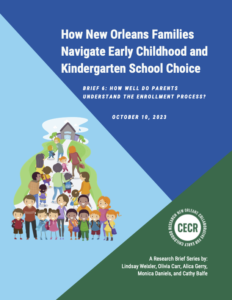 Parents say they don’t always understand how the enrollment process works or feel skeptical that it works the way that the school district says it does. But beyond a general distrust of the process, can these misunderstandings actually negatively affect families’ chances of getting a preferred seat? The sixth brief in our series, “How Well Do Parents Understand the Enrollment Process?” addresses common myths voiced by families and highlights the best approaches to the application that can help families get a seat in one of their preferred programs.
Parents say they don’t always understand how the enrollment process works or feel skeptical that it works the way that the school district says it does. But beyond a general distrust of the process, can these misunderstandings actually negatively affect families’ chances of getting a preferred seat? The sixth brief in our series, “How Well Do Parents Understand the Enrollment Process?” addresses common myths voiced by families and highlights the best approaches to the application that can help families get a seat in one of their preferred programs.